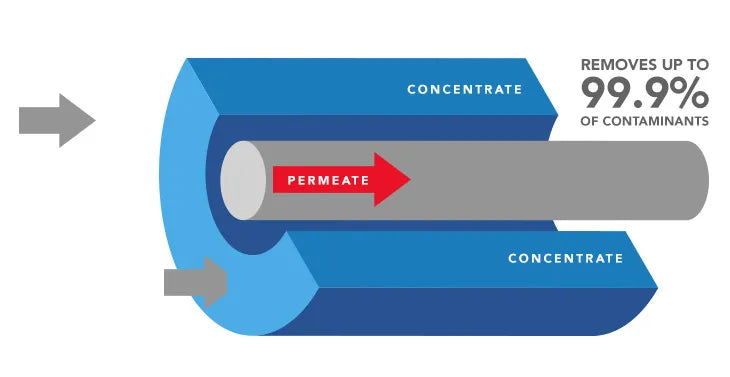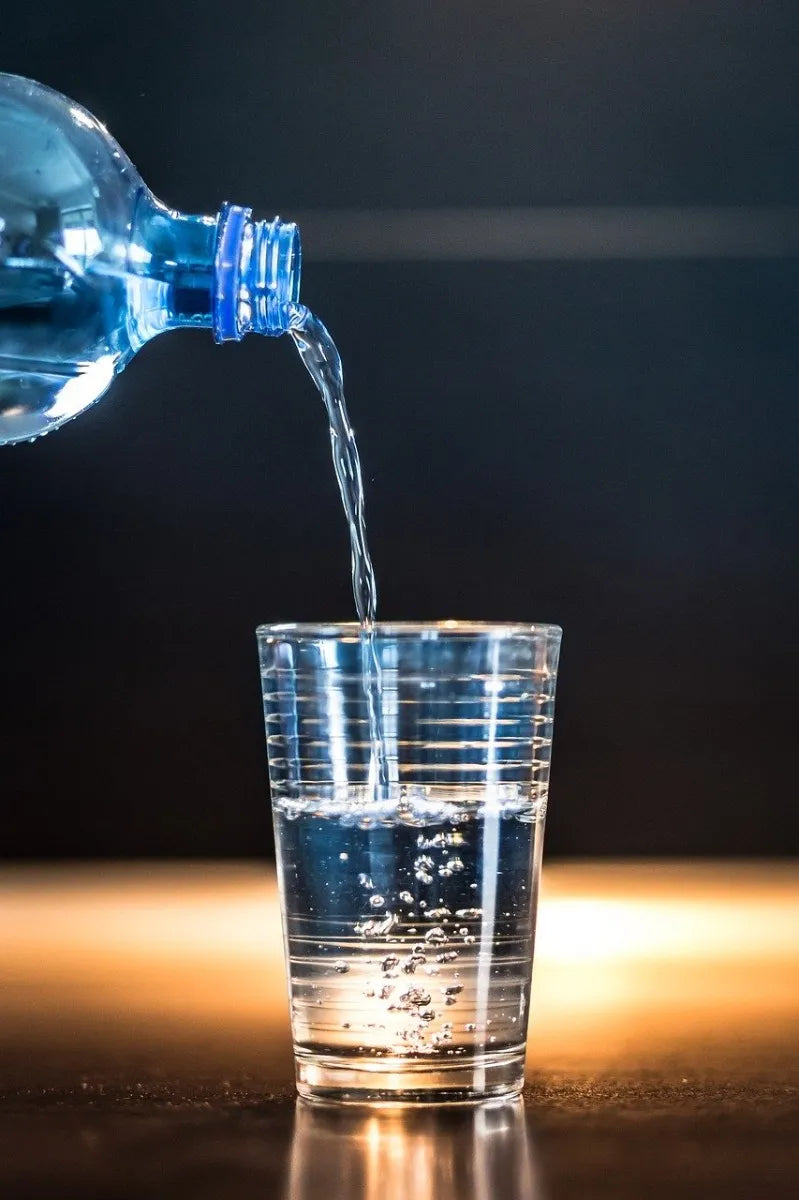SIGN UP FOR OUR NEWSLETTER
Receive our latest updates about our products & promotions.

Reverse osmosis is a filtration method that passes water through pores in a filter membrane that are so small, only the pure water water is able to get through. Other contaminates are physically too large and thus unable to pass through the pores of the system, so they do not enter in to the drinking water supply.
Reverse Osmosis Systems are far more cost effective than bottled water and they don't rely on flavorings and additives. The water produced by a reverse osmosis system is generally cleaner than the bottled water offered in a store. If you are looking for an alternative for your costly bottled water, a reverse osmosis system is the best option.

Most reverse osmosis filters need to be changed every six to twelve months. Though, depending on the quality of your registration system, such as a water softener or well water treatment system, you may be changing it more or less frequently.
US Water Systems is proud to offer top of the line reverse osmosis systems for under $200. These Apuapurion RO systems are built to last, and can be easily afforded on most family incomes. We also offer a wide range of filters for use with most RO systems.
If you are looking to get your own reverse osmosis system installed, all of our systems come with easy to read instruction manuals, which make it a breeze for anyone who is relatively handy to quickly install a home reverse osmosis system. For those of you who are not plumbing inclined, any licensed plumber will be able to get your system installed without a hitch.
US Water Systems stands behind every product we sell. We are so confident you will love any of our systems that we offer a 30 day money-back guarantee (ask for details).
Reverse Osmosis, often called RO, is the best solution for providing quality drinking water, and is very effective for reducing a range of home water contaminants Partial List. Most RO systems include a sediment pre-filter that traps fine suspended materials which may clog the membrane, and a carbon pre-filter to remove chlorine and other contaminants that may damage RO membranes. A post carbon filter generally polishes the water.
A RO system will dramatically improve the taste, color, and odor of the water. US Water is the source for all types of Reverse Osmosis Systems, Replacement Filters, Reverse Osmosis Membranes, Reverse Osmosis Installation Parts, Reverse Osmosis Accessories, and Designer Faucets for Reverse Osmosis Systems. With the largest selection of RO systems, highest quality NSF Certified Components, factory-direct-cut-out-the-middleman prices, and the best warranties in the industry, US WATER is simply the best solution. If you are not sure which system is best for you, one of our water specialists will be glad to assist you in deciding. Call us at 800-608-8792 or e-mail us at info@uswatersystems.com.


The reverse osmosis process is a filtration method in which water is passed through a filter membrane with pores so small that only pure water is able to get through. Other contaminants are physically too large to pass through the membrane, so they do not enter the water supply.
Reverse Osmosis removes the widest spectrum of contaminants of any water treatment process. Water is forced through semi-permeable membranes leaving the dissolved particles in the more highly concentrated solution.
An emerging concern with bottled water has been the recently discovered presence of microplastics. A study conducted at the State University of New York in Fredonia tested 259 bottles of water from 11 brands across 9 countries. Out of the 259 bottles tested, only 17 were found to be free of plastic. In fact, on average, each liter sold contained 325 pieces of microplastic.These contaminants included polypropylene, nylon, and polyethylene terephthalate. A publication from the World Health Organization recommends the use of Reverse Osmosis Systems to remove microplastics from drinking water.
The National Academies of Sciences, Engineering and Medicine recommends that men consume about 125 ounces of fluid a day and women should drink about 91 ounces daily. You get around 20% of this from food. If we use this model and assume you buy bottled water in bulk from Costco the price would be around 70 cents per 16.9 ounces which breaks down to 4 cents per ounce.
If you follow the recommendation and drink 100 ounces per day you can calculate your cost like this:

Let's compare this cost to the yearly cost of the All American Reverse Osmosis System. The 5-stage AARO ( All American Reverse Osmosis System) starts out at $349.95, the filters for this system need to be changed annually or semi-annually depending on water conditions. Let's assume you need to purchase filters every six months. The price of replacement filters runs $59.95 but you can save 10% if you enroll in autoship. The annual cost breaks down like this:
Initial purchase price ($349.95) + replacement filter cost if replaced every 6 months ( $59.95x2) = $469.85 for the first year and $119.90 annually.
The annual cost of purchasing bottled water is over 10 times the cost of Reverse Osmosis.
| Contaminant | Reduction | Contaminant | Reduction |
|---|---|---|---|
| Algae | 99.90% | Mercury | 98.00% |
| Aluminum | 98.00% | Mold | 99.90% |
| Amoebic Cysts | 99.00% | Nickel | 95.00% |
| Arsenic | 95.00% | Nitrate | 89.00% |
| Asbestos | 99.00% | Phosphate | 95.00% |
| Atrazine | 95.00% | Potassium | 95.00% |
| Bacteria | 95.00% | Protozoa | 99.00% |
| Barium | 97.00% | Radioactivity | 95.00% |
| Calcium | 99.50% | Sediment | 99.00% |
| Chloride | 95.00% | Selenium | 95.00% |
| Chlorine | 99.90% | Silicate | 89.00% |
| Chromate | 94.50% | Silver | 97.00% |
| Copper | 99.00% | Sodium | 94.00% |
| Cryptosporidium Cysts | 97.00% | Strontium | 97.00% |
| Cyanide | 97.00% | Sulfate | 95.00% |
| Fluoride | 98.00% | Thiosulfate | 99.00% |
| Giardia Lamblia Cysts | 99.00% | Trihalomethane | 98.00% |
| Lead | 97.00% | Volatile Organics | 95.00% |
| Manganese | 98.00% | Zinc | 97.00% |
| Magnesium | 97.00% | Z, 4-D | 95.00% |
Every Reverse Osmosis System sold by US Water Systems comes with an easy to read installation guide. If that's not enough, then we also have step by step installation videos available for every product we make. While the installations are simple and straight forward, you can also hire a plumber to perform the installation.
As a general rule we suggest that our customers purchase one of our water tests before buying a system. The test is sent off to an independent 3rd party laboratory for testing. This allows us to provide independent and unbiased facts to our customers regarding the underlying cause of their current water issues. More importantly, it allows us to provide different solutions to the water issues that our customers face. Even better, if you choose to go with one of our recommended systems, the water test acts as a $100 credit towards the purchase price.
Receive our latest updates about our products & promotions.
Thanks for subscribing!
This email has been registered!